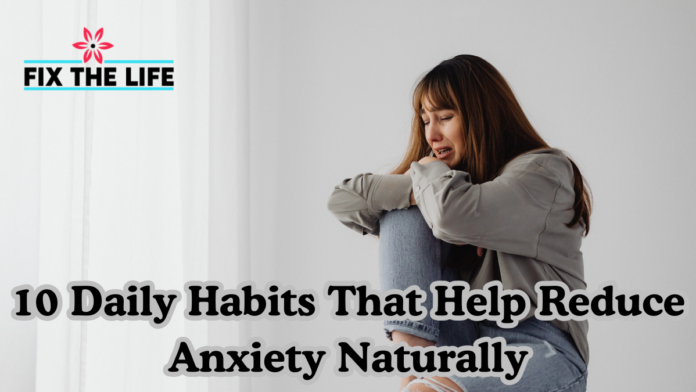Anxiety is a common part of modern life, but it doesn’t have to control your day. By adopting simple daily habits to reduce anxiety, you can gently calm your mind, restore balance, and improve your emotional resilience over time. These habits don’t require drastic lifestyle changes—just small, consistent steps that support better mental health routines and make anxiety more manageable.
Whether you’re dealing with occasional stress or chronic anxiety, these natural approaches can help you regain a sense of control and peace.
Daily Habits To Reduce Anxiety
1. Start Your Day with Deep Breathing
Beginning your morning with a few minutes of deep, intentional breathing can set a calming tone for the rest of the day. Deep breathing lowers cortisol levels (your body’s main stress hormone) and increases oxygen flow to your brain, reducing anxious thoughts.
Try this: Breathe in through your nose for 4 counts, hold for 4 counts, and exhale through your mouth for 4 counts. Repeat for 5–10 minutes.
2. Get Moving with Light Exercise
Exercise doesn’t have to mean hours at the gym. A 20-minute walk, yoga session, or a dance break in your living room can make a noticeable difference. Physical activity releases endorphins—your brain’s natural mood boosters—and helps regulate stress hormones.
Bonus tip: Morning workouts are especially effective at improving mood throughout the day.
3. Practice Mindfulness or Meditation
Regular mindfulness practice helps you stay present and quiets racing thoughts. Even five minutes a day of focusing on your breath or observing your thoughts without judgment can ease anxiety.
Apps like Headspace or Calm offer guided meditations tailored for anxiety relief, perfect for beginners.
4. Limit Caffeine and Sugar Intake
While coffee or sweet treats might provide a quick energy boost, they often lead to crashes that can worsen anxiety. Caffeine stimulates your nervous system, which can trigger anxious feelings, especially in those already prone to them.
Healthier alternatives: Try herbal teas like chamomile or green tea, which contain calming compounds.
5. Stay Connected with Others
Social connection is a powerful antidote to anxiety. Talking to a friend, family member, or even a co-worker can reduce feelings of isolation and give you perspective.
Make it a habit: Schedule regular check-ins with supportive people in your life, even if it’s just a quick chat.
6. Create a Simple, Consistent Routine
A predictable routine gives your brain a sense of control and stability. Uncertainty and disorganization often fuel anxiety.
Start small: Set regular sleep and meal times, plan out your day, and break large tasks into manageable steps.
7. Limit News and Social Media Consumption
Constant exposure to bad news or unrealistic portrayals of life on social media can increase feelings of worry and inadequacy.
Set healthy boundaries: Designate specific times for checking news or scrolling and avoid screens an hour before bed.
8. Write It Out in a Journal
Journaling is a powerful tool for processing emotions and identifying thought patterns. Writing down your worries helps you externalize them and may make them feel less overwhelming.
Pro tip: End your journaling session with 3 things you’re grateful for to help shift focus to the positive.
9. Spend Time in Nature
Spending even 10–15 minutes outdoors can reduce stress and improve mood. Studies have shown that time in green spaces lowers cortisol levels and promotes a sense of well-being.
Ideas: Take your lunch outside, go for a park walk, or garden in your backyard.
10. Prioritize Sleep and Wind-Down Time
A good night’s sleep is essential for emotional regulation and anxiety management. Poor sleep can intensify anxious feelings and reduce your ability to cope with stress.
Create a bedtime routine: Dim the lights, avoid screens, and read or listen to soothing music before bed.
FAQ
Q1: Can these habits replace medication for anxiety?
A: While these habits are powerful for mild to moderate anxiety, they aren’t a substitute for professional treatment. Always consult with a healthcare provider before making changes to your mental health routine.
Q2: How soon will I see results from these habits?
A: Some practices, like deep breathing, provide immediate relief, while others may take a few weeks of consistency to show lasting benefits.
Q3: What if I can’t stick to all 10 habits daily?
A: That’s okay! Start with 2–3 that feel most manageable and build from there. The goal is progress, not perfection.
Q4: Are these habits suitable for children or teens?
A: Yes, with slight adjustments. Activities like journaling, mindfulness, and outdoor play are great anxiety coping tips for younger individuals too.
Q5: How can I track my progress?
A: Keep a simple log or journal. Note your anxiety levels each day and which habits you practiced. Over time, patterns will emerge that show what works best for you.
Final Thoughts
These daily habits to reduce anxiety can serve as the foundation of a healthier, calmer lifestyle. When woven into your everyday routine, they help create space for peace, self-awareness, and emotional balance. Remember—small changes lead to big results, especially when practiced with patience and consistency.
Whether you’re just starting your mental health routines or looking for new anxiety coping tips, these strategies are a natural and empowering place to begin.




